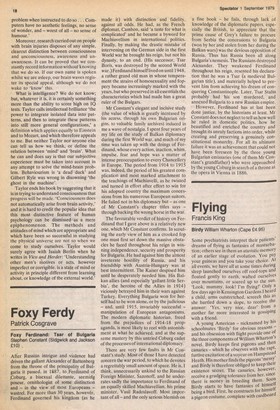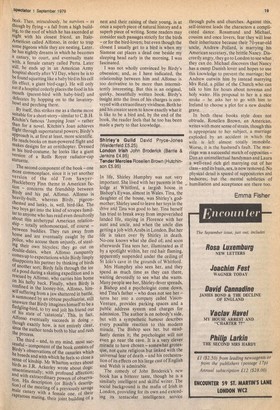Flying
Francis King
Birdy William Wharton (Cape £4.95) Some psychiatrists interpret their patients' dreams of flying as fantasies of masturbation; others see in them an atavistic memory of an earlier stage of evolution. You pay your guineas and you take your choice. At all events, we have all at some times during sleep launched ourselves off roof-tops and floated gently to earth, wafted ourselves over mountains, or soared up to the sun. 'Look, mummy, look! I'm flying!' Only a few days ago in Kensington Gardens I heard a child, arms outstretched, screech this as she hurtled down a slope, to receive the answer: 'Yes, very nice, dear' from a mother far more interested in gossiping with a friend. A young American — nicknamed by his schoolmates 'Birdy' for obvious reasons — and his obsession with flight provide one of the three components of William Wharton s novel. Birdy keeps first pigeons and then canaries — which he observes with the rapt, furtive excitation of a voyeur on Hampstead, Heath. His mother finds the pigeons 'messy and Birdy is therefore obliged to keep their existence secret. The canaries, however, receive a grudging tolerance from her, since there is money in breeding them. Soon. Birdy starts to have fantasies of himself being a bird. First, he constructs for himself a pigeon costume, complete with cardboard beak. Then, miraculously, he survives — as though by flying — a fall from a high building, to the roof of which he has ascended at night with his closest friend, an ItaloAmerican called Alfonso, in order to trap some pigeons while they are nesting. Later, he has nightly dreams in which he becomes a canary, to court, and eventually mate With, a female canary called Perta. Later Still, he ends up in an American Army hospital shortly after VJ Day, where he is to be found squatting like a baby bird in his cell (in effect, a giant bird-cage). He will only eat if a hospital orderly places the food in his mouth (parent-bird with baby-bird) and defecates by hopping on to the lavatorybowl and perching there.
By itself, this strikes me as a theme more suitable for a short-story —similar to C.B.H. Kitchin's famous 'Jumping Joan' — rather than for a novel. Kitchin's Joan achieves flight through supernatural powers; Birdy's approach is, at first at least, more scientific. He reads books on man-powered flight and makes designs for an ornithopter. Dressed in his bird-costume, he looks like a giant version of a Rolls Royce radiator-cap statuette.
The second component of the book — one more commonplace, since it is yet another version of the old Tom SawyerHuckleberry Finn theme in American fiction — concerns the friendship between Birdy and his pal, Alfonso. Alfonso is heavily-built, whereas Birdy, pigeonchested and lanky, is, well. bird-like. The tWo boys get into the kind of scrapes familiar to anyone who has read even desultorily about this archetypal American relationship — totally unhomosexual, of course — between buddies. They run away from home and are eventually caught by the Police, who accuse them unjustly, of stealing their own bicycles; they go out on double-dates, when Alfonso rampantly comes up to expectations while Birdy limply disappoints his partner by thinking of birds of another sort; Birdy falls through the ice of a pond during a skating expedition and is rescued by Alfonso, who carries him home on his hefty back. Finally, when Birdy is Confined in the looney-bin, Alfonso, himself suffering from a jaw shattered in battle, is summoned by an obtuse psychiatrist, still unaware that Birdy imagines himself to be a fledgling-bird, to try and jolt his friend out of his state of 'catatonia'. This, in fact, Alfonso eventually succeeds in doing — though exactly how, is not entirely clear, since the author tends both to blur and rush the process.
The third — and, to my mind, most successful — component of the book consists of Birdy's observations of the canaries which he breeds and with which he feels so close a sense of kinship. Mr Wharton writes about birds as J.R. Ackerley wrote about dogs: unsentimentally; with profound affection; and with extraordinary powers of observation. His description (or Birdy's description) ot the meeting of a previously savage male canary with a female one, of their rapturous mating, their joint building of a nest and their raising of their young, is at once a superb piece of natural history and a superb piece of writing. Some readers may consider such passages strictly for the birds — or for the bird-lovers; but even though the closest I usually get to a bird is when my Siamese cat places a dead one beside my sleeping head early in the morning, I was fascinated.
I was not wholly convinced by Birdy's obsession; and, as I have indicated, the relationship between him and Alfonso is too derivative to be more than intermittently interesting. But this is an original, quirky, beautifully written book. Birdy's insight into the lives of his charges is conveyed with extraordinary vividness. Both he and his creator seem to know exactly what it is like to be a bird and, by the end of the book, the reader feels that he too has been made a party to that knowledge.
In life, Shirley Humphry was not very important. She lived with her parents in the lodge at Whitford, a largish house in Bishop's Eywas, almost in Wales. Tina, the daughter of the house, was Shirley's godmother; Shirley used to leave her toys in the drive arid Tina was good to her. Tina herself has tried to break away from impoverished landed life, staying in Florence with her aunt and uncle, and when the uncle dies getting a job with Arabs in London. But her life is taken over by Shirley in death. No-one knows what she died of; and soon afterwards Tina sees her, illuminated as if by a spotlight within, her red hair flaming, apparently suspended under the ceiling of St Lob's cave in the grounds of Whitford.
Mrs Humphry also sees her, and they spend as much time as they can there, waiting devotedly to see what she wants. Many people see her, Shirley-fever spreads, a Bishop and a psychologist come down, and Tina's father — who does not see her — turns her into a company called VisionVenture, provides parking spaces and a public address system and charges for admission. The author is on nobody's side, but with a sympathetic humour describes every possible reaction to this modern miracle. The Bishop secs her, but steadfastly denies it; the psychologist will not even go near the cave. It is a very clever miracle to have chosen — somewhat grotesque, not quite religious but linked with the universal fear of death — and his orchestration of its effects on his large cast of English and Welsh is admirable.
The comedy of John Broderick's new book has a bitterer taste, though he is a similarly intelligent and skilful writer. The social background is the mafia of Irish in London, providing for its own and extending its tentacular intelligence service through pubs and churches. Against this, self-interest leads the characters a complicated dance. Rosamund and Michael, cousins and once lovers, fear they will lose their inheritance because their 70-year-old uncle, Andrew Pollard, is marrying his American secretary, the brittle Nancy. Discreetly angry, they go to London to see what they can do. Michael discovers that Nancy has a camp Danish lover and hopes to use this knowledge to prevent the marriage; but Andrew outwits him by instead marrying Mrs Reid, a pillar of the Church who can talk to him for hours about novenas and holy water. His proposal to her is a nice stroke — he asks her to go with him to Ireland to choose a plot for a new double 'grave.
In both these books style does not obtrude. Rosellen Brown, an American, writes with more sense of strain, though this is appropriate to her subject, a marriage exploded by an accident in which the wife is left almost totally immobile. Worse, it is the husband's fault. The marriage was a successful match of opposities — Dan an unintellectual handyman and Laura a well-read rich girl marrying out of her class— and its basis, sex, is now 'removed. No physical detail is spared of suppositories and bedsores; but the mental subtleties of humiliation and acceptance are there too.
Emma Fisher































 Previous page
Previous page